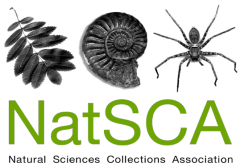- Basics of Natural Science Collections
- Mobilising specimen biodiversity data
- Natural Science Collections and Environmental Action
- Decolonising Natural Science Collections
- Collections and the Law
- Intro to Georeferencing
- NatSCA 2023
- NatSCA 2024
- NatSCA 2025
- Upcoming Events and Workshops
- Awards and Bursaries
- CryoArks Biobank
- Advocacy
- Insect Collection Managers Group
- Regional Museum Networks
- Previous Events and Workshops
- Job Listings
- Employment Resources
- Publications
- FENSCORE
Collections and the Law
Natural Science Collections and the Law
The document below is intended to give keepers of natural science collections guidance on the legalities of holding specimens. It is not intended to be definitive: for further information/clarification please contact DEFRA (Animal and Plant Health Agency - APHA) or Natural England.
If anyone has anything they would like to add/amend to this document, experiences any problems operating under this guidance or would like some help or advice, please contact us by email to web@natsca.org.
We have also also made selected presentations available from our 2016 and 2023 Natural Science Collections and the Law Seminars. Note that the CITES presentation by Nichola Burnett contains very easy tables to check when museums would need a licence to charge for activities that may include CITES specimens.
Substances controlled under the Misuse of Drugs Regulations 2001
As you may know, NatSCA has been working on resolving the problem of museum drugs licensing with the Home Office. Museums are required to have a licence to hold drugs in their collections and it is illegal to transport or supply drugs without a licence.
We hope to be able to update this information soon.
For further information please consult the Home Office website.
Nature Conservation Legislation
- How CITES works.
- Species+ is an up-to-date list of all CITES and EU listed species.
- DEFRA guidelines
- Archived DEFRA guidelines for museums. These are not current but may be of some use as they have specific comments for museums.
- CITES Digital Service Government Gateway Registration Guide
- CITES Digital Service Update May 2023
- Ins and outs of ABS and CITES in plant collections [YouTube] Alan Paton, Royal Botanic Gardens at Kew
- Ins and outs of ABS and CITES in plant collections [PowerPoint] Alan Paton, Royal Botanic Gardens at Kew
- CITES and Wildlife and Countryside Act 1981 - animals [YouTube] Nichola Burnett, Joint Nature Conservation Committee (JNCC)
- CITES & museum collections Nichola Burnett, Joint Nature Conservation Committee (JNCC)
- UK Wildlife Legislation & Collections Paolo Viscardi and Alex Morss
Rhino Horn
Human Remains
- Human Tissue Act 2004 Licensing Guidence
- Human Tissue Act 2004 in relation to museum collections [YouTube] Michelle Lancaster, Human Tissue Authority (HTA)
- Guidance for the Care of Human Remains in Museums - DCMS
Nagoya Protocol
- Information on the Nagoya Protocol.
- Can we keep it? Dealing with the Nagoya Protocol and its implications for collections Chris Lyal, The Natural History Museum
Shipping and Loans
- Learning from Loans [YouTube] Amy Geraghty, National Museum of Ireland
- Shipping Dangerous Goods (UK)
- Shipping Dangerous Goods (US)
Guidelines
- Geological legislation considerations [YouTube] Kevin Page, ProGeo
- Poisons in herbaria [YouTube] Rachel Webster, Manchester Museum
- Pesticides and the Law: The Effect of EU Biocide Regulation 528/ on Natural History Collections
Robert Child - ICOM Code of Ethics for Natural History Museums
